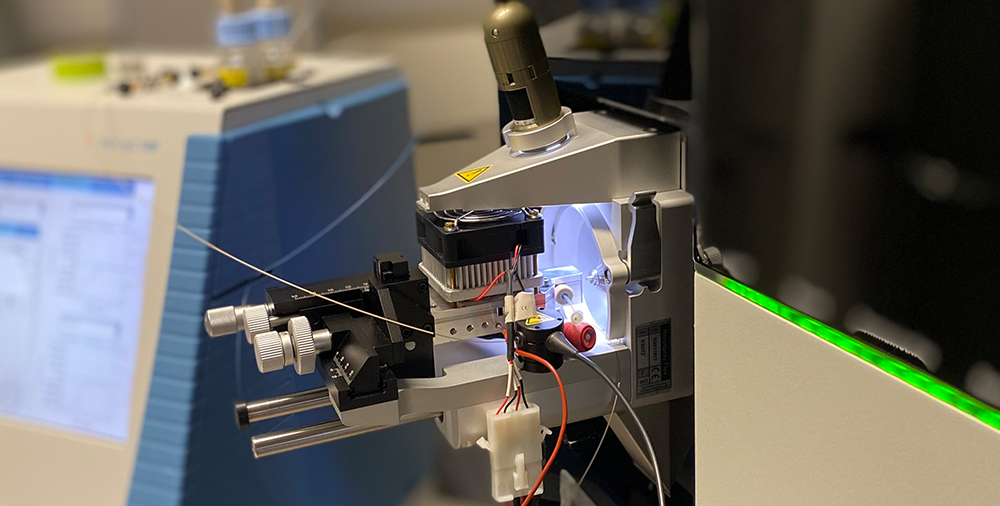An advanced proteomics solution for minute amounts of samples
The Chemical Biology Mass Spectrometry (ChemBioMS) Proteomics Platform from UNIGE has developed an advanced proteomics strategy for precise protein quantification from limited amounts of samples.
 A sample is being analyzed on a LC-MS system combining an Easy-nano liquid chromatography and an Orbitrap Fusion mass spectrometer. @Harry Theraulaz / ChemBioMS Proteomics Platform
A sample is being analyzed on a LC-MS system combining an Easy-nano liquid chromatography and an Orbitrap Fusion mass spectrometer. @Harry Theraulaz / ChemBioMS Proteomics Platform
Adipose tissue is exceptional in its ability to adapt to changes in physiological and environmental conditions. Single-cell RNA sequencing (scRNA-seq) of white adipose tissue (WAT) has revealed cell complexity and heterogeneity of functionally diverse subpopulations of mesenchymal stromal cells. However, transcript levels are not sufficient to predict the corresponding protein levels in many scenarios. A moderate protein-mRNA correlation has been reported in several organisms, including yeast, Drosophila melanogaster, mice and humans.
Despite its necessity, gene expression at multiple levels and its significance in determining adipose stromal cell heterogeneity and function remained largely unknow. “Unlike DNA or RNA, proteins cannot be amplified”, said Dr. Yibo Wu, head of the ChemBioMS Proteomics Platform at Faculty of Science. “One of the main challenges to characterize these cells at protein level is the technical limitation in precise and producible protein quantification from very limited amounts of samples. This is also a major research challenge for many other projects, when researchers aim to quantify proteins from small amounts of materials.”
To respond to this challenge, Dr. Wu and her team have recently developed an advanced mass spectrometry (MS)-based proteomics strategy to quantify thousands of proteins from limited numbers of adipose stromal cells in a precise and reproducible manner. The multilayered omics study was published in Cell Metabolism, and a detailed description of the workflow for the proteomics analysis is currently online in Star Protocols.
In this protocol, the authors described steps for cell isolation using Fluorescence-activated cell sorting (FACS), proteomics sample preparation, data-independent acquisition mass spectrometry (DIA-MS), and computational analysis. The quantification of thousands of proteins from small numbers of FACS-sorted cells has enabled estimation of protein-mRNA correlation at a subpopulation resolution. The data has shown a significant yet nominal correlation between expression of protein and its transcript counterpart in isolated stromal cells, and revealed the influence of protein or transcript variation, sex and depot, as well as the examined pathway on the protein-mRNA correlation.
Importantly, the precise and reproducible protein quantification by DIA-MS has facilitated the identification of underlying mechanisms driving stromal cell heterogeneity, and potential regulatory pathways governing the unique functional properties of adipose tissue progenitor subpopulations. More broadly, the developed approach can be readily applied to other complicated cell subpopulations and samples with limited materials.
Mass spectrometry (MS)-based proteomics is considered the most comprehensive approach for quantitative analysis of proteins, their modifications and interactions. “We believe that the approach described here may be leveraged to gain insight into various research topics at our Faculty”, says Dr. Wu. In the meantime, the Proteomics Platform is committed to providing a variety of proteomics solutions to specific research projects.
References:
- The multilayered omics study is published in Cell Metabolism
- The protocol is published in Star Protocols
Related articles:
- Multilayered Genetic and Omics Dissection of Mitochondrial Activity in a Mouse Reference Population
- Systems proteomics of liver mitochondria function
- Application of SWATH Proteomics to Mouse Biology
Contact:
Dr. Yibo Wu
Head of the ChemBioMS Proteomics Platform
Faculty of Science
+41 22 379 62 84
www.unige.ch/chembioms/proteomics/welcome
